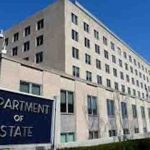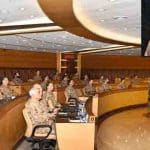Geneva, Aug 31 (AFP/APP): On her way out the door on Wednesday, UN rights chief Michelle Bachelet will release a report on alleged violations in China’s Xinjiang region, infuriating Beijing.
The outgoing High Commissioner for Human Rights promised to release the report before her mandate expires at the end of August.
“The report on Xinjiang will go out by the end of the day,” spokesman Jeremy Laurence told AFP with just hours left of her four-year term.
Beijing stands accused of detaining more than one million Uyghurs and other Muslim minorities in the far-western Xinjiang region.
Campaigners accuse China of a litany of abuses, including mass incarceration, forced labour, compulsory sterilisation and the destruction of Uyghur cultural and religious sites.
The United States and lawmakers in other Western countries have gone as far as accusing China of committing “genocide” against the minority groups.
Beijing vehemently rejects the claims and has long insisted it is running vocational training centres in Xinjiang designed to counter extremism.
It claims the allegations are part of a plot by the United States and other Western nations to smear China and contain its rise.
Bachelet came under increasing pressure to investigate and speak out as the allegations mounted.
– A ‘fabricated lie’: China –
Nearly a year ago, the former Chilean president told the UN Human Rights Council that an independent evaluation of the situation was needed — and indicated that her office was finalising a report.
But it was repeatedly delayed amid growing impatience from rights groups and some countries.
Zhang Jun, China’s ambassador to the UN in New York, said Beijing had made it clear to Bachelet that it was “firmly opposed” to the rights assessment.
“The so-called Xinjiang issue is a completely fabricated lie out of political motivations and its purpose is definitely to undermine China’s stability and to obstruct China’s development,” he told reporters.
Zhang said Bachelet should “stay independent and… not resign to the political pressure of a number of Western countries.”
Bachelet and her office have repeatedly explained that one reason the report was delayed was because it had been sent to Beijing first for comments, as is common with such reports.
But Zhang maintained that Chinese officials had not seen the report yet, and were in any case “completely opposed” to it.
“It simply undermines the cooperation between the UN and a member state. It completely interferes in China’s internal affairs,” he said.
– ‘Cowardly’ –
In her farewell press conference last Thursday, Bachelet admitted she was under “tremendous pressure to publish or not to publish” the long-delayed report.
“But I will not publish or withhold publication due to any such pressure,” she said.
But her decision to release the report on her way out the door, leaving her as-yet unappointed successor to deal with the aftermath, has raised some eyebrows.
During a press briefing in New York on Wednesday, UN chief Antonio Guterres’s spokesman was asked whether the secretary-general condoned such “cowardly” behaviour.
“He does not share your analysis and the adjectives used in describing Madame Bachelet’s work,” Stephane Dujarric told reporters.
“He fully respects the independence of the Office of the High Commissioner and the work of the High Commissioner.”
Bachelet released a departing video on Wednesday in which she said the world was at a critical juncture, with shrinking space for debate, often coupled with attacks on rights defenders.
She did not reference the Xinjiang report but said: “That’s the essence of human rights work: doing the hard job of putting the finger where it hurts.”
“The journey to defend human rights never ends.”
– ‘Better late than never’ –
In May, Bachelet concluded a rare six-day visit to China that took her to Xinjiang.
During her visit, she had urged Beijing to avoid “arbitrary and indiscriminate” measures in the region.
But rights groups criticised her for a perceived lack of firmness. They said she had capitulated to a stage-managed tour of Xinjiang orchestrated by Beijing.
Human Rights Watch said the report would help to show that no state is above the law.
“Better late than never,” HRW’s China director Sophie Richardson told AFP. “If this does in fact happen, it will be a watershed moment.”
Follow the PNI Facebook page for the latest news and updates.









